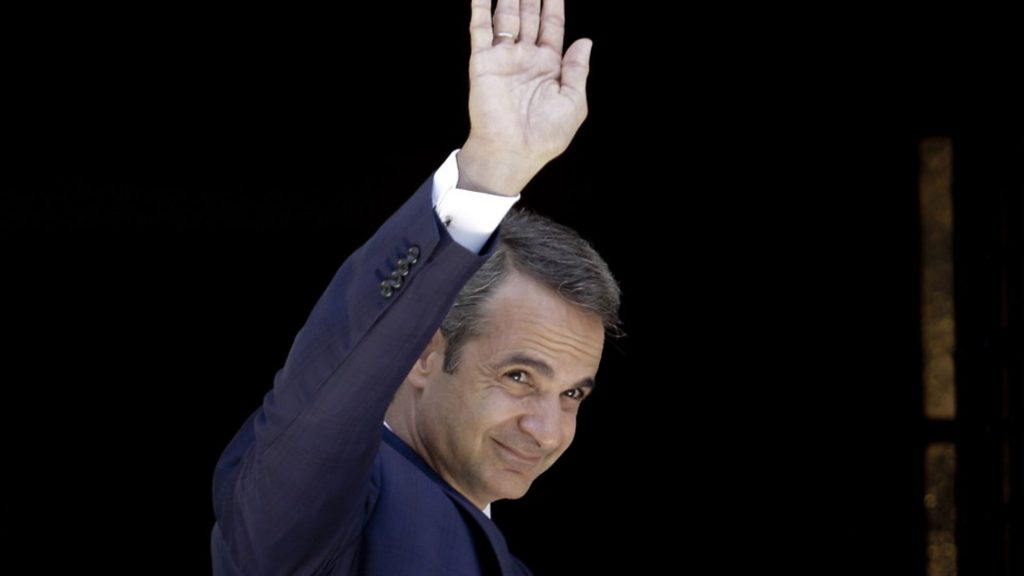
Greece may have slipped from the continent’s headlines, but it has not yet emerged from the shadows of the crash. PAUL KNOTT assesses its progress

“Tomorrow, the sky will be a bit bluer, the sun a little brighter… a new day is beginning for our country,” declared Greece’s prime minister Kyriakos Mitsotakis upon being elected last September.
His optimism was partly justified because Greece has made considerable progress since its debt crisis shook the euro, and the EU itself, just a few years ago.
The disappearance of the crisis from the headlines is a mark of Greece’s success in stabilising the situation. But, while significant steps in the right direction have been taken, the country still has a long way to go on the road to recovery.
Given the distraction of other events elsewhere in Europe since, it is easy to forget just how far Greece had slid into economic catastrophe and political chaos during the years that followed the 2007-08 global financial crisis.

The crash left Greece drowning in unpayable debts. Successive governments had taken these on by presenting false statistics to negligent banks, mostly in other European countries. The crisis led to an unprecedented 26% drop in Greece’s GDP between 2008 and 2014 and an unemployment rate of 27%. Almost half of the Greek population was pushed below the poverty line.
The established political parties of both right and left were discredited by the mismanagement that led Greece to ruin. Indeed, the centre-left PASOK party virtually disintegrated, surviving only as a faction within the new ‘Movement for Change’ alliance that collectively holds a mere 19 of the 300 seats in the Greek parliament. Meanwhile, the vacuum was being filled by extremists such as the openly-fascist Golden Dawn party.
Remarkably, it was the radicals from the other end of the political spectrum who emerged to steer their country to safer ground. Upon taking office in January 2015, the left-wing Syriza coalition led by Alexis Tsipras was widely derided as a collection of utopian fanatics who would accelerate Greece’s descent into oblivion.
Some of its statements rejecting the reality of Greece’s financial position and in support of malign influences such as Russia did indeed offer ample grounds for concern.
But in government, Syriza plotted a sensible course – despite numerous dramatic trials and tribulations along the way. It deserves significant credit for doing so and for establishing a platform upon which Greece can finally build for the future again.
This stabilisation was achieved in the face of immense internal and external pressures. The EU and IMF’s insistence that Greece run a 3.5% budget surplus for five years to ensure that its creditors (mainly the foreign banks who had been grossly irresponsible in their lending to previous Greek governments) were paid was counter-productive. It forced Syriza to enact unnecessarily harsh austerity measures that acted as a severe break on economic recovery and subjected the Greek people to great hardship.
Nonetheless, Greece is now in its fourth successive year of economic growth (at a rate slightly above the European average) and has built up some cash reserves while edging away from the brink of bankruptcy.
Numerous reforms have been enacted and unemployment has been reduced to 17%. Politically, Golden Dawn has collapsed, although a new, less thuggish but equally vitriolic far-right party called Greek Solution is emerging in its place.
Achieving this relatively successful outcome from the deeply-unpromising circumstances it inherited in 2015 has come at a cost for Syriza.
Its embrace of pragmatism and the tough decisions it had to make in government alienated some of its more idealistic supporters. It lost power too, when it was voted out of office in the September 2019 election.
Concerns have now shifted to the new government led by Mitsotakis. Despite his conservative party’s ‘New Democracy’ name, there is nothing new about it. It is one of the two traditional parties responsible for getting Greece into such an almighty mess in the first place.
As is common in Greek politics, Mitsotakis represents an old-style nepotistic dynasty, with his father Konstantinos having been a New Democracy prime minister in the early 1990s.
This heritage and the presence of assorted elitists and right-wing populists in the party prompts some observers to question New Democracy’s suitability to lead the next stage of Greece’s recovery.
As outlined in a recent report by Dr Constantine Michalopoulos of the respected Hellenic Foundation for European and Foreign Policy (ELIAMEP) think tank, Greece still has many more problems to overcome in order to build a secure long-term future for its people.
The debt burden remains suffocating and in need of further renegotiation. Though reduced, unemployment and poverty are still widespread. On top of the human misery involved, this limits the day-to-day household spending available to fuel further growth.
A decade-long brain drain is also continuing, as young and skilled Greeks leave the country to seek better opportunities elsewhere. This is, of course, understandable on a personal level but the loss of their talents and labour make generating a national economic revival even more difficult.
Much essential structural reform remains to be carried out too. The brain drain is compounded by the schools and universities failing to equip enough people with the skills Greece needs to compete in the contemporary economic environment.
An inefficient justice system and a poorly-functioning public sector bureaucracy contribute to Greece’s lowly standing in the global ‘ease of doing business’ rankings.
Economic dynamism is further inhibited by high taxation (largely as a result of the conditions imposed by the IMF and Greece’s European partners) and the uncompetitive grip that is still exerted on crucial sectors of the economy by wealthy and well-connected oligarchs.
Compared to the other worst-affected European countries that escaped faster from the financial crash, such as Ireland and Portugal, Greece also faces some specific challenges that make its recovery even more difficult.
It is one of the few Nato members that meets its commitment to spend 2% of its budget on defence. As well as pressure from the US government to maintain this level of spending, it is difficult to cut because of the presence on Greece’s borders of its historic enemy Turkey under the belligerent leadership of president Erdogan.
In addition, Greece has largely been abandoned by its fellow Europeans to bear the brunt of the refugee crisis. The Greek people have shown impressive forbearance and many of them have engaged in outstanding acts of welcome and relief work to alleviate this acute humanitarian problem.
But thousands of migrants remain marooned in often appalling conditions in Greece due to the refusal of most other European countries to share the load. This presents Greece with a significant economic burden and a smouldering social crisis that could explode if it remains unresolved.
All of these challenges present prime minister Mitsotakis with an unenviable workload, albeit, thanks to the efforts of his predecessor, one less onerous than the critical situation Tsipras inherited in 2015.
Since taking office, Mitsotakis has spent a considerable amount of time soliciting much-needed foreign investment into Greece and lobbying creditors and the international financial institutions to loosen the debt straitjacket. Both are essential external policy objectives. But it remains to be seen whether his populist- and oligarch-influenced party will be willing to take the difficult decisions still required to reform Greece internally.
The good news for Greece is that even if New Democracy does slip into its bad old backroom dealing ways, then Syriza’s surprising conversion into a credible party of government leaves it well placed for a return to power.
Perhaps, against all odds, the ancient cradle of democracy may even emerge from a traumatic decade as a pioneer for the modern-day renewal of it.









